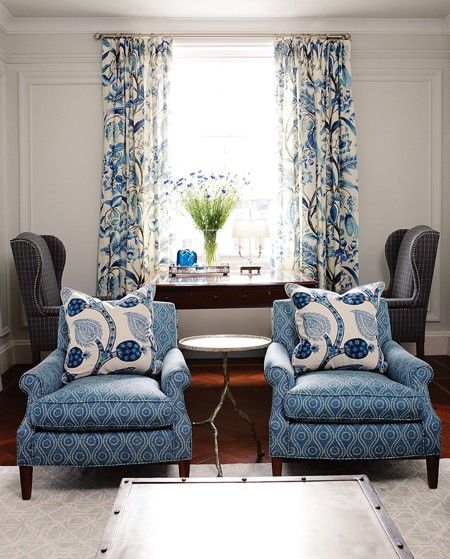
“I love my home but slowly I have been making decor updates. In Interior Decorating magazines and TV shows, I always see designers mix different patterns and prints. I love the look but I have no idea how to mix patterns, can you help me get that “designer” look?’
Great question and yes, designers and decorators are always mixing different prints, patterns, textures and colours – by doing that you completely elevate the look of any room but it can be tricky! Adding pattern and print to your space is also a great way to add personality to your space. Pattern is so versatile and can be added to any room – bedrooms, living room, dining room and more. Pattern can be brought into a room using drapery, pillows, chairs and rugs but don’t forget about wallpaper accent walls, head boards, bedding and even dishware!
Follow our simple steps, you be be able to mix patterns like a pro!
1. Work with an odd number of patterns.
Odd numbers tend to look best, so if you’re going to play with patterns, start with three different patterns in three different scales. Once you’ve mastered the key to mixing patterns, try for five!

2. Use varying scales of pattern.
Incorporate varying scales to the space so that the prints don’t compete with one another. Sticking with the rule of three, pick one large, one medium and one small pattern to work with. For example, try one large floral/organic pattern, plus one medium geometric, plus one small classic pattern.

3. Large patterns work best on large pieces, small patterns work best on small pieces
When choosing the location of your patterns, keep in mind the space in which you are working. A large pattern works best on a large item, such as a wall, window treatment or area rug. because the space is large enough to accommodate the pattern in its entirety. A medium pattern is better suited to furniture and a small pattern to accent pieces. (Note: Sometimes, small patterns can look busy when used in large amounts.)

4. Look for a large pattern that incorporates all of your colours.
One approach to begin building your mix of patterns if your space has several colors in it, is to think of the large pattern as your anchor. It should be the biggest, boldest and incorporate ALL of your colors in your color scheme. From there, pick a different, medium-sized pattern (about half the size of your large pattern) that utilizes SOME of the colors. Lastly, the small pattern can use just TWO or THREE of your colors. One easy way to do this is to look for a fabric that has coordinating patterns available.

5. You can use pattern, even if you have a monochromatic room.
Alternatively, if you have a single color, play with different shades of the color. So long as you still vary the scale and type of pattern, you can create a very cohesive look of mixed patterns this way.

6. Consider adding a solid to the mix.
Don’t be afraid to throw in a solid to soften and ground the look! A solid can also help anchor the whole room which will allow the eye to focus.

7. Group together patterns that have similar qualities
If you have a defined style in your home, also give some thought as to the types of patterns that you mix together. Traditional patterns tend to mix easier with other traditional patterns, versus mixing them with bold, contemporary prints. So for example, traditional prints such as florals, plaids, and damask don’t always blend easily with chevron or ikat. This doesn’t mean you can’t mix patterns across styles – in fact, sometimes, an unexpected print gives a pop to the room – but if you’re just starting to experiment with pattern, it is often easier to stick within a style.

8. Be sure to balance your patterns in the space.
Balance is key! This includes not only balancing the scale of your patterns, but balancing them equally throughout the space to avoid a lop-sided feeling.

9. Stick with a consistent hue.
Within your color palette, use colors with consistent intensities. If your palette is pastel, don’t mix in a bold jewel tone and vice-versa.

10. Don’t be afraid to break the rules!
Beauty is in the eye of the beholder, so break the rules if it looks good to you! Sometimes, complementary patterns and motifs come together in an organic and unplanned fashion, so if it looks good to you, go for it and have fun!

Mixing up patterns and prints is so much fun and it really adds to the space – Don’t be afraid to mix it up!



